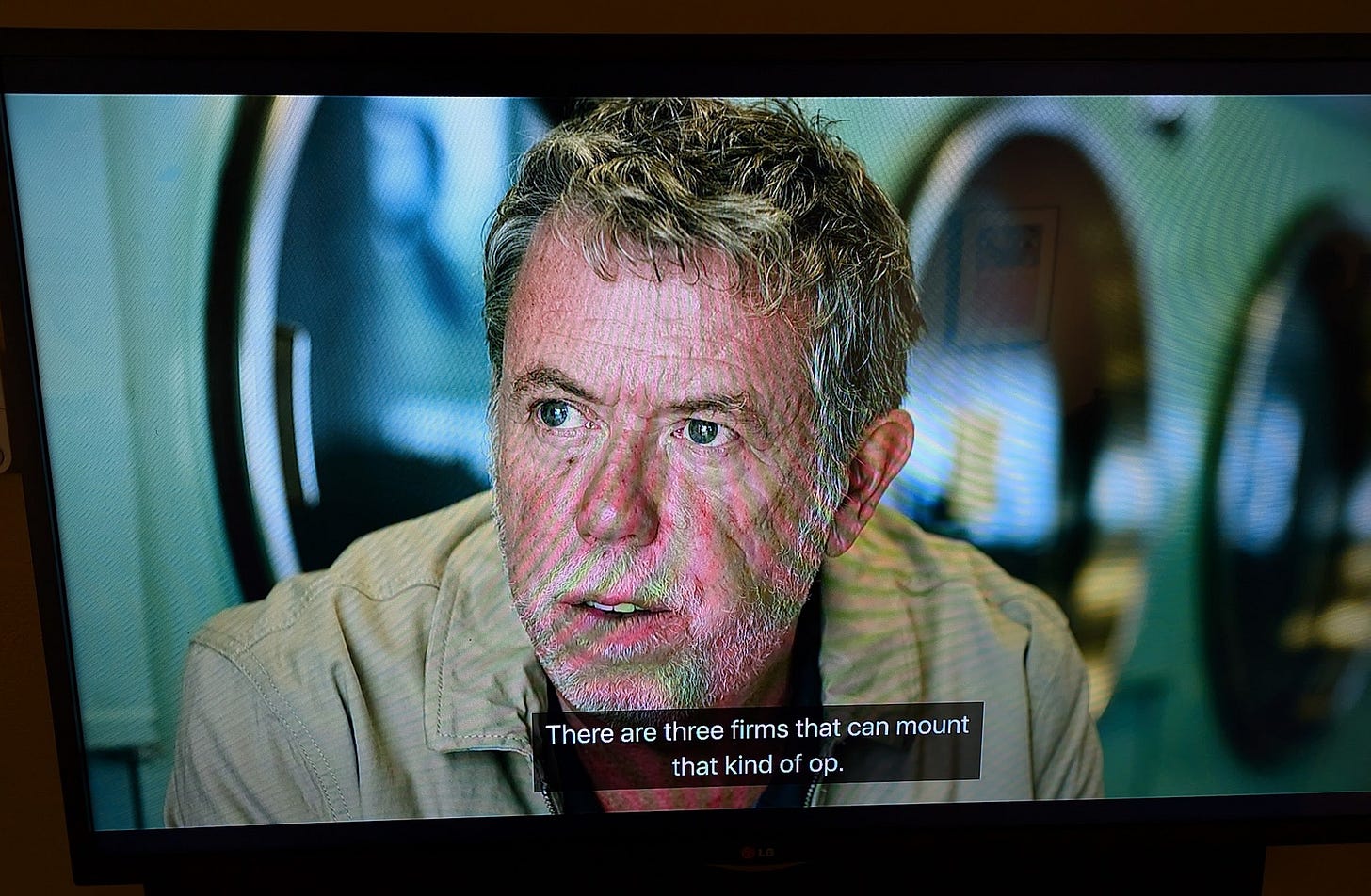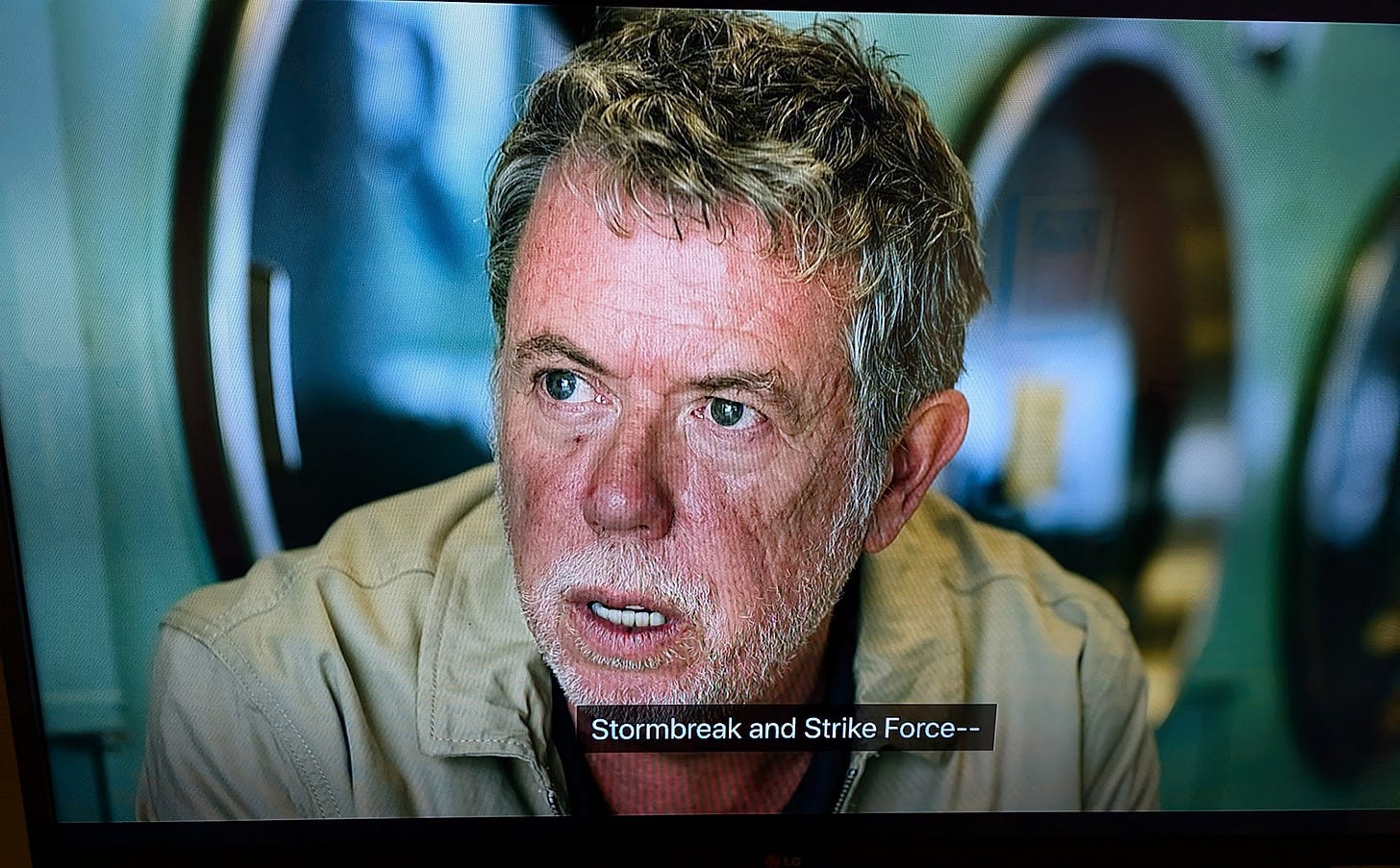Mercenaries
By any other name.
As attentive readers know, I have long resisted biting into the Apple product line. Last week, though, Roku made me an offer I chose not to refuse: three free months of AppleTV+. Plenty of time, I figured, to watch all four seasons of Slow Horses, the only Apple show that interested me.1 I’m a big fan of Mick Herron, the author of the Slough House spy novels on which the show is based, and the series’ cast — especially Gary Oldman as Jackson Lamb, Saskia Reeves as Catherine Standish, and Kristin Scott-Thomas as Diana Taverner — looked promising.2 And Herron himself was a script consultant! It had to be good, right?
Well, good enough. The series takes sweeping liberties with Herron’s characters and settings; collapses or expands timelines; and cranks up the violence to Grand Guignol levels. Still, the acting is excellent and the production values are 10/10.
And every so often there’s a bit of dialogue that makes me hit Pause and take screenshots.
Here’s a case in point from Season 3. In the second episode, Jackson Lamb, the brilliant, slovenly British intelligence officer who now supervises a crew of disgraced spies — the “slow horses” — seeks confirmation that someone he’s tracing is employed by a private security firm. He meets at a coin laundry with former MI5 security chief “Bad” Sam Chapman, an old acquaintance and occasional intel source.
Here’s the part of their conversation that made me chortle:
Unsurprisingly, he had me at “fucking names.” Especially because these aren’t just any fucking names: they’re the fucking names of private military contractors, aka PMCs, aka extralegal mercenary armies. And as it happens, I’ve had a longstanding interest in the fucking names of those fucking mercenaries.
Way back in 2007, in a blog post I titled “Namers, Guns, and Money,” I rated the names of eight such firms, from AQMI Strategy (RIP) to Spartan Group (still extant). An excerpt from that post:
APTRONYMIC EXCELLENCE AWARD: Custer Battles. Incredibly, this “international business risk consultancy,” whose tagline is “Transforming Risk into Opportunity,” is named for its founders, Scott Custer and Michael Battles. Who may not have stopped to consider, when they were ordering the business cards, that history’s other Custer lost.
Custer Battles, which was embroiled in some nasty business in Iraq, met an ignominious end.
In 2009 I wrote about the rebranding of one of the most notorious PMCs, Blackwater, as Xe. The company had originally been named for its place of origin, North Carolina’s Great Dismal Swamp, where the water was darkened by peat. “Blackwater” was a menacing, memorable name that unfortunately became sullied by — you know what’s coming — some nasty business in Iraq.
Alas, nobody knew what to make of “Xe,” pronounced “zee,” and so in 2011 the company announced another name change, to Academi. The new name supposedly evoked “the ideas of a Platonic academy, where the ethos is of excellence, honor, and discipline.” Or as Wired put it at the time: “Translation: no more stealing guns, coked-up warzone parties, or killing civilians.” Lovely bunch of guys, these mercs. I wrote about the Academi name, too.
Finally, sort of, in 2014 Academi and another PMC, Triple Canopy, were swallowed up by a larger “risk management company” — now, there’s a euphemism — called Constellis. “Triple Canopy” had alluded to “the layered canopies in the jungles where some of the key founding members received training.” “Constellis,” derived from “constellation,” was more opaque: the sort of bland, faux-Latin name that says nothing more than “we’re corporate.” It could just as easily be the name of an air-conditioner manufacturer or a bank.
Funny thing about Blackwater’s shifting identity, though: None of it stuck. Everyone kept right on calling it Blackwater. It was, as I wrote in 2021, an undead brand name:
Whatever you may think of the company and its mission, “Blackwater” is a potent, memorable name. (It’s so good that it’s been used by many other brands, from a bike shop to a distillery to a rock band.) Unlike Xe and Academi, it isn’t artificially constructed or hard to spell or pronounce. It’s a real place name (on three continents), a compound of two real English words. It shows up in the titles of novels and films and as the title of an episode of Game of Thrones, set on the fictional Blackwater Bay. “Blackwater” calls to our senses: We can see it, hear it, dip our fingers into it.
Is blackwater also the name of a terrible disease? It is. Sometimes a shadow of risk, a tinge of negativity, helps make a brand name distinctive.
Which is why, fifteen years after Blackwater ceased to be the official name of a PMC, it still appears in present-tense news stories.
Evidence? Here’s the top search result for “Blackwater” right now: a Newsweek headline dated November 24, 2024: ‘No Chance’ Ukraine Gets Back Russia-Annexed Lands—Blackwater Founder.
Emphasis added.
And the lede:
Amid the ongoing Russia-Ukraine war, Erik Prince, the founder and former CEO of private military company Blackwater, warned on Sunday that Kyiv should give up on any hopes of reclaiming its annexed territories from Moscow if it wants an end to the conflict.
Emphasis added. (Also, before you take this guy’s advice, please Google “Erik Prince” and “shady.”)
Once more for the folks in the back: Blackwater has not been the company’s name for fifteen years. And yet people just can’t quit it.
Jackson Lamb could tell you why. It may be a zombie name, but it’s also one of those Fucking Names: as close as you can get to Rock Hard Cocks while preserving the veil of decency. Blackwater then, Blackwater now, Blackwater for-fucking-ever.
Bonus: Gary Oldman talks about bringing Jackson Lamb to life (four-minute video).
But I’m persuadable! What else is worth adding to my watchlist?
And, in Season 4, James Callis as MI5 First Desk Claude Whelan, the archetypal brunchlord.






I was thinking this post was going to be about *euphemisms* for mercenary groups, so here's my pitch for one: Roth IRAs. Because they help people "retire," and the initialism evokes... a different sort of group!
Severance, Severance, Severance.